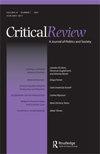《年轻的福柯案例
IF 1.7
3区 社会学
Q4 POLITICAL SCIENCE
引用次数: 0
摘要
摘要从1949年到1961年(或者可以说是1966年),福柯早期思想出现了三个相互关联的维度。首先,年轻的福柯对康德的先验概念提出了黑格尔的观点。福柯认为,思想的先验条件既形成于历史经验,又产生于历史经验。其次,福柯借鉴了海德格尔对康德的研究,认为现代思想建立在人的有限性的前提下,并包含了一种植根于哲学人类学的有问题的认识论。福柯认为,人类学使可能的知识范围得到了巨大的扩展,其前提是人类的理解本质上是有限的,即使它包含了对人类存在的一种削弱的概念。第三,福柯对当代心理学和精神病学进行了尖锐的批判,认为他们错误地寻求获得关于人类的积极知识,尽管后者本质上是由福柯所说的“消极性”定义的。这种对年轻福柯的三管齐下的解释使我们能够更好地将福柯的作品置于知识史中,澄清他的主要论点,把握他年轻和成熟思想的表达。本文章由计算机程序翻译,如有差异,请以英文原文为准。
A Case for the Young Foucault
ABSTRACT Between 1949 and 1961 (or, arguably, 1966), three interconnected dimensions of Foucault’s early thought emerged. First, the young Foucault offered a Hegelian perspective on Kant’s notion of the transcendental. The a priori conditions of thought, Foucault suggested, both shape and arise from historical experience. Second, Foucault drew on Heidegger’s study of Kant to argue that modern thought rests on the premise of human finitude and embraces a problematic epistemology rooted in philosophical anthropology. Foucault argued that anthropology enabled a vast extension of the scope of possible knowledge predicated on the falsely modest pretense that human understanding is inherently limited, even as it embraced a diminished conception of human existence. Third, Foucault developed a pointed critique of contemporary psychology and psychiatry, maintaining that they fallaciously seek to acquire positive knowledge of human beings, despite the fact the latter are inherently defined by what Foucault called “negativity.” This three-pronged interpretation of the young Foucault allows us to better situate Foucault’s work in intellectual history, to clarify his key arguments, and to grasp the articulation of his youthful and his mature thought.
求助全文
通过发布文献求助,成功后即可免费获取论文全文。
去求助
来源期刊

Critical Review
POLITICAL SCIENCE-
CiteScore
1.30
自引率
12.50%
发文量
17
期刊介绍:
Critical Review: A Journal of Politics and Society is a political-science journal dedicated to advancing political theory with an epistemological bent. Recurrent questions discussed in our pages include: How can political actors know what they need to know to effect positive social change? What are the sources of political actors’ beliefs? Are these sources reliable? Critical Review is the only journal in which the ideational determinants of political behavior are investigated empirically as well as being assessed for their normative implications. Thus, while normative political theorists are the main contributors to Critical Review, we also publish scholarship on the realities of public opinion, the media, technocratic decision making, ideological reasoning, and other empirical phenomena.
 求助内容:
求助内容: 应助结果提醒方式:
应助结果提醒方式:


